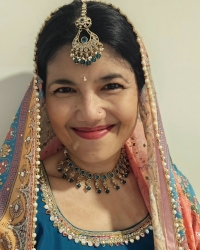Tamil (Hindu traditions) in Qatar

Photo Source:
Anonymous
|
Send Joshua Project a map of this people group.
|
| People Name: | Tamil (Hindu traditions) |
| Country: | Qatar |
| 10/40 Window: | Yes |
| Population: | 30,000 |
| World Population: | 3,640,000 |
| Primary Language: | Tamil |
| Primary Religion: | Hinduism |
| Christian Adherents: | 5.00 % |
| Evangelicals: | 3.00 % |
| Scripture: | Complete Bible |
| Ministry Resources: | Yes |
| Jesus Film: | Yes |
| Audio Recordings: | Yes |
| People Cluster: | South Asia Hindu - other |
| Affinity Bloc: | South Asian Peoples |
| Progress Level: |
|
Introduction / History
The homeland of the Tamil people is southeast India. Tamil is one of the major languages of India and the 17th most spoken language in the world. Tamils are proud of their cultural and literary heritage that dates back over 2000 years. Many thousands of Tamils have left India and live in dozens of countries throughout the world including Qatar. Some migrated to Qatar as indentured servants during the era of the British Empire. The ability of the Tamils to speak English gives them an advantage in international business. The Tamils speak their own language at home and Arabic with their neighbors. A small fraction of Tamils in Qatar has become followers of Jesus Christ.
What Are Their Lives Like?
The Tamils in Qatar live diverse lives. The educated English and Arabic speaking Tamils live middle or upper class lifestyles. They work in universities, science, commerce, and as professionals. Recently arrived Tamils have a more difficult time working in jobs in construction, restaurants and factories while they and their children learn the Arabic language. For the most part, the Tamils try to fit into Qatari society and stay out of politics. Tamil parents encourage their children to pursue higher education and obtain university degrees. The father is the head of the Tamil family. He shares leadership with his wife over the children. A woman has a higher place in the Tamil home than in most Asian and Middle Eastern cultures. Tamils in Qatar try to maintain their ethnic identity and at the same time become model Qatari citizens. In traditional Tamil culture, the parents chose the spouse of their children. This practice has changed in modern society where the young generation usually choose their partner with their parents' guidance.
What Are Their Beliefs?
The large majority of Tamils in Qatar practice Hinduism, the ancient religion of India. The patron god of the Tamils is Murugan, the Hindu god of war. Hindus worship and serve the gods of the Hindu pantheon. Hindus believe that by performing rituals and good works that they will attain moksha or freedom from the endless cycle of birth, death and rebirth. The Tamils visit Hindu temples and offer prayers, food, flowers, and incense to their gods in hopes of gaining protection and benefits. They do not have a personal or familial relationship with their gods as Christians do with their heavenly Father. There are many forms of Hinduism, each with its own deities and beliefs. The Hindus in Qatar try to be discrete in their religious practices because many Muslims see Hindus as idol worshippers. The main yearly holidays of the Hindu Tamil people are Holi, the festival of colors and the start of spring, Diwali, the festival of lights, Navratri, the celebration of autumn and Rama Navami, Rama's birthday. The Tamils in Qatar also frequently celebrate Muslim holidays. The Tamil New Year is celebrated on April 14.
What Are Their Needs?
The Tamils in Qatar need to understand that material success will not bring them the happiness they are seeking. Jesus Christ is much more than a Hindu god or guru. Only through Christ can a Tamil receive the forgiveness of his or her sins and the gift of eternal life.
Prayer Points
Pray the Lord raises up a Disciple Making Movement among the Tamils in Qatar in this decade. Pray the Lord moves believers and churches to reach out and share the good news with the Tamils. Pray that more Christian literature, internet material and videos become available in the Tamil language. Ask God to bring Tamil leaders and heads of families into His kingdom.